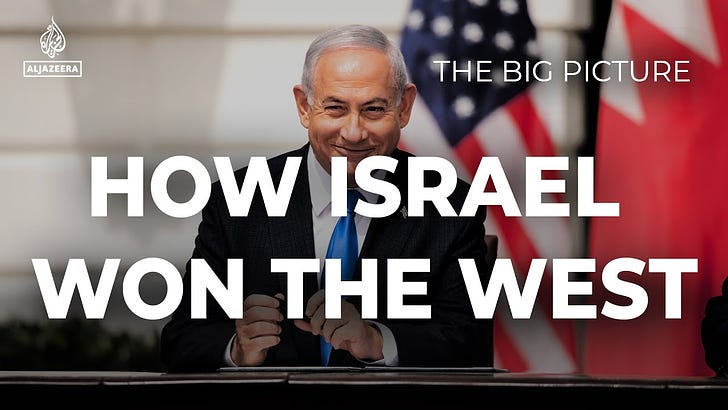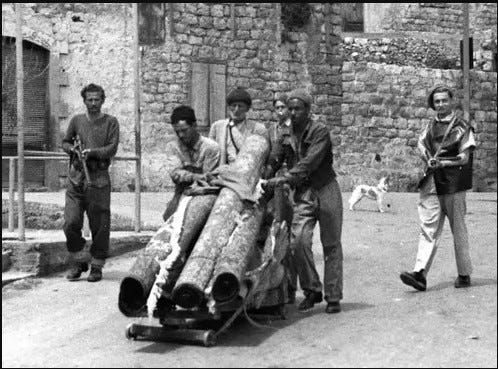This is a documentary about how Israel leveraged history, geopolitics, and identity to secure a privileged position in the Western world.
From Persecution to Privilege
The documentary traces the journey of Jewish identity from biblical origins and centuries of persecution to the eventual integration of Jews into the white Western world. Historically despised as "Christ killers" by early Christians, Jews became the target of anti-Judaism, which later mutated into the more pervasive and modern form of anti-Semitism.
Over time, the narrative shifted, and Jews were embraced as part of a "Judeo-Christian" heritage, laying the groundwork for Zionism's alignment with Western civilisation. This transformation positioned Jews as part of the Western fold, though still as a distinct group, and facilitated their support for the founding of Israel. The film highlights the ideological foundations of Zionism, particularly the beliefs of Ze'ev Jabotinsky, who argued that force was necessary to impose Zionism and overcome Palestinian resistance.
This philosophy set the stage for Israel's colonisation of Palestine. Zionism, though initially framed as a movement of Jewish liberation, became increasingly entwined with Western colonial interests. The documentary illustrates how Zionism's goals were framed not just as the creation of a Jewish homeland but as part of the broader project of aligning with Western colonial powers, pushing against the people of the East—primarily Arabs and Muslims—who were framed as the "other" in a clash of civilisations.
A Settler-Colonial Reality
Zionism's settler-colonial nature is exposed in the documentary as a reality that required continuous suppression and marginalisation of Palestinians. The film argues that Palestinians, but also Arab Jews, have been kept at the margins of Israeli society, with European Ashkenazi Jews rising to prominence as the dominant group. This created a deeply unequal society, with Palestinians facing systemic oppression and displacement. The documentary critiques how these realities were justified by the idea that force—rather than peaceful coexistence—was necessary to achieve the Zionist vision of a Jewish state, laying the groundwork for ongoing violence and dispossession of Palestinians.
The film explores how the "special relationship" between Israel and the United States became central to maintaining Israel's settler-colonial project. This relationship, rooted in both strategic interests in the Middle East and a shared Judeo-Christian identity, helped solidify Israel’s position as a key ally in the West. It critiques how this bond enabled Israel's actions, with the U.S. supporting Israel's right to defend itself while ignoring the brutal reality of occupation and ethnic cleansing in Palestine. The documentary points to the "whitening" of Jews in the Western imagination as a pivotal factor that allowed Israel to be embraced by the West, despite its actions against Palestinians.
War, Genocide, and Western Complicity
In the documentary's most poignant sections, the horrors of the ongoing conflict are laid bare, with particular emphasis on the massacre of Palestinian civilians in Gaza and the broader violence in Lebanon. The film argues that Israel's continued war on Gaza, particularly after the attacks on October 7, 2023, reflects an unfolding genocide against Palestinians.
The documentary critiques how Israel's actions are framed by the West as self-defence against "terrorists," perpetuating a narrative of civilisational warfare between the "Judeo-Christian" world and the "barbarians." It underscores how Western complicity, rooted in historical and ideological ties, continues to legitimize Israel’s occupation and violence against Palestinians, perpetuating a cycle of dehumanisation and brutality.
A Parallel Journey
The documentary, in many ways, mirrors the trajectory of my own series of articles meant traces the journey of Zionism from its early beginnings all the way to the horrific attacks on October 7, 2023, and the genocidal war waged by Israel in response. Both delve into the historical foundations of Zionism and examine how this ideology has shaped the ongoing violence and occupation of Palestine.
They share a common aim to critically address the role of Western powers in supporting Israel's actions and to highlight the devastating impact of settler-colonialism on the Palestinian people and the apartheid that exists in Israel.
Racism in Israel
How Israel Won the West also delves into the reality of apartheid within Israel itself, where systemic discrimination against Palestinians is entrenched in both law and practice. This is not just limited to the occupied territories but also extends to Palestinian citizens within Israel’s borders. A particularly striking aspect of the documentary is its exploration of how even some Arab Jews, in an effort to assimilate into Israeli society, have distanced themselves from their roots and adopted the same hatred for Arabs that is deeply embedded in Zionist ideology.
In doing so, they often align themselves with far-right, extremist political parties that promote even more severe discrimination and violence towards Palestinians. This disturbing trend not only highlights the internal divisions and racism within Israeli society but also reveals how the dehumanization of Palestinians is used to solidify the power and support of right-wing factions in Israel.
Slim hope
How Israel Won the West presents a sobering look at the links between Zionism, settler-colonialism, and Western geopolitical interests. The documentary exposes the historical reasons behind Israel's special status in the West, forcing viewers to think about the ethical and political impact of ongoing support for Israel's actions in Palestine, while showing how harmful narratives have justified these actions.
It ends by highlighting the harsh realities on the ground—especially the live-streamed genocide, often shown by Israel's own soldiers on social media—revealing the cruelty faced by innocent civilians. This shocking reality calls for a movement to challenge Israeli exceptionalism, end apartheid in Palestine, and stand up for justice and dignity, and we hope that over a year after the genocide started, we can see this movement forming.
Featured Experts
The documentary features insights from a range of scholars, including:
Shaul Magid – Visiting professor of modern Jewish studies, Harvard University’s Divinity School
David Freidenreich – Professor of Jewish studies, Colby College
Omer Bartov – Professor of Holocaust and genocide studies, Brown University
Raz Segal – Author, Genocide in the Carpathians
Michelle Mart – Associate professor, Pennsylvania State University
Arie M. Dubnov – Associate professor, George Washington University
All articles on Diaspora Dialogue are free to read for one year from publication. If you’ve enjoyed this piece and would like to support my work, you can do so by subscribing, or by buying me a coffee. Thank you for reading and being part of the dialogue!





